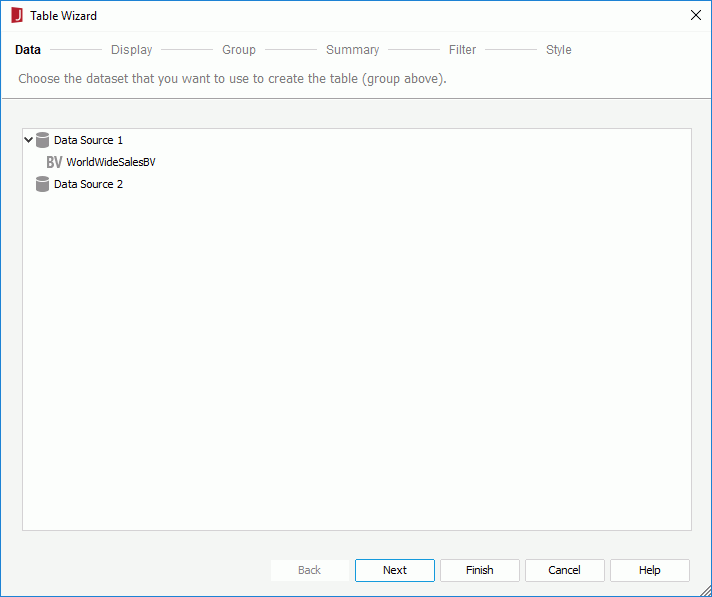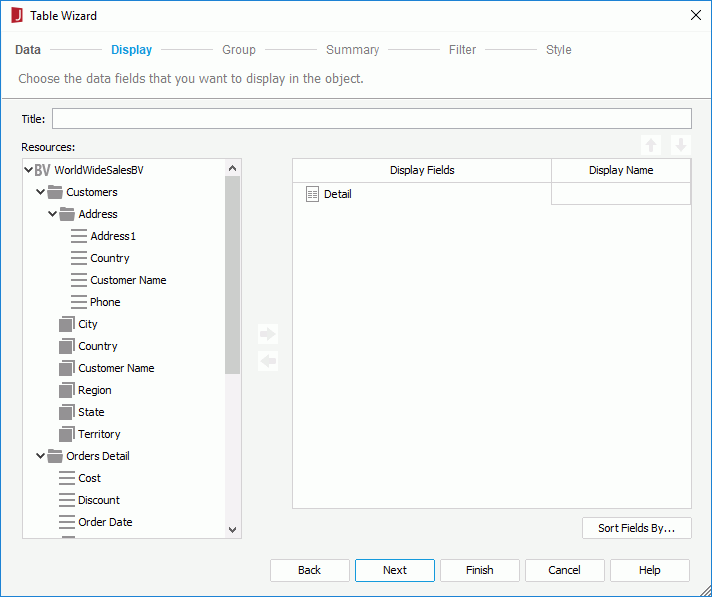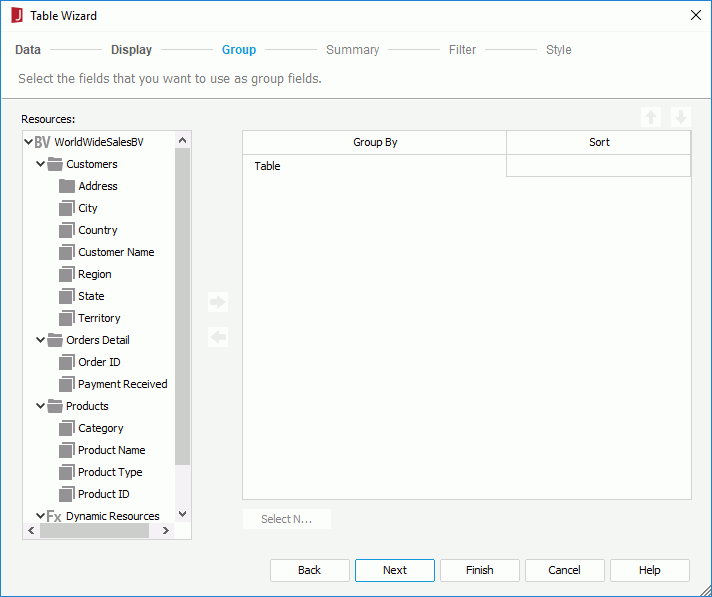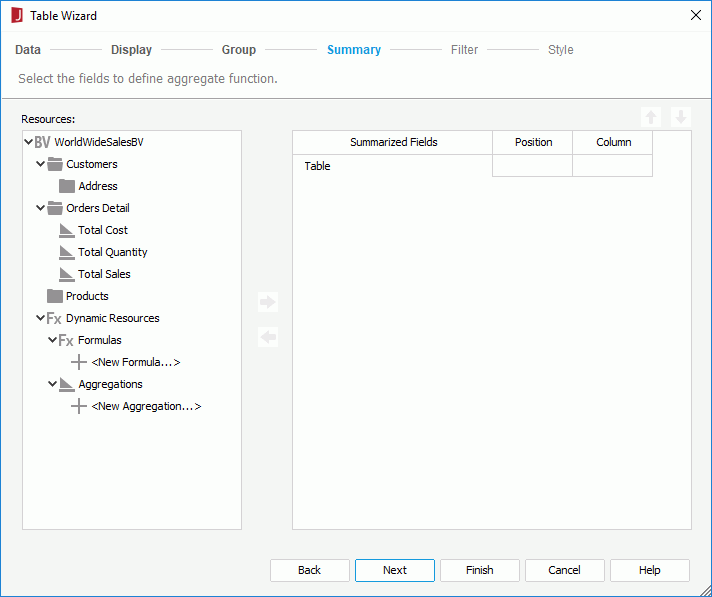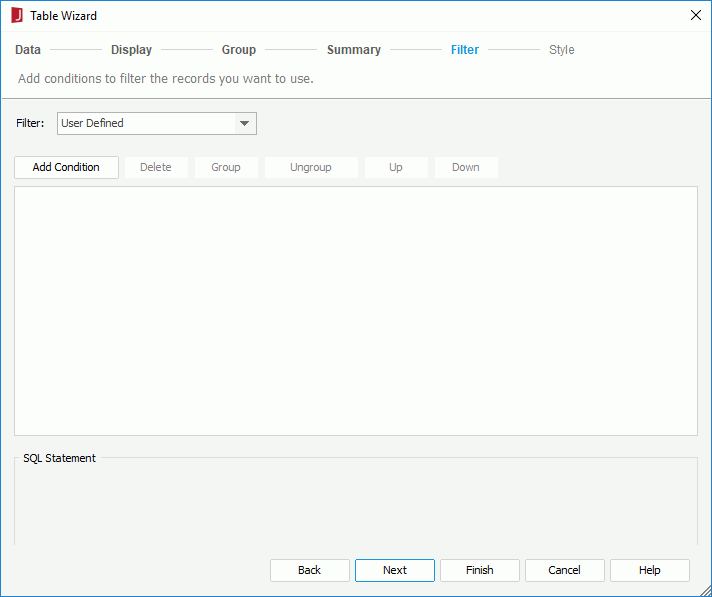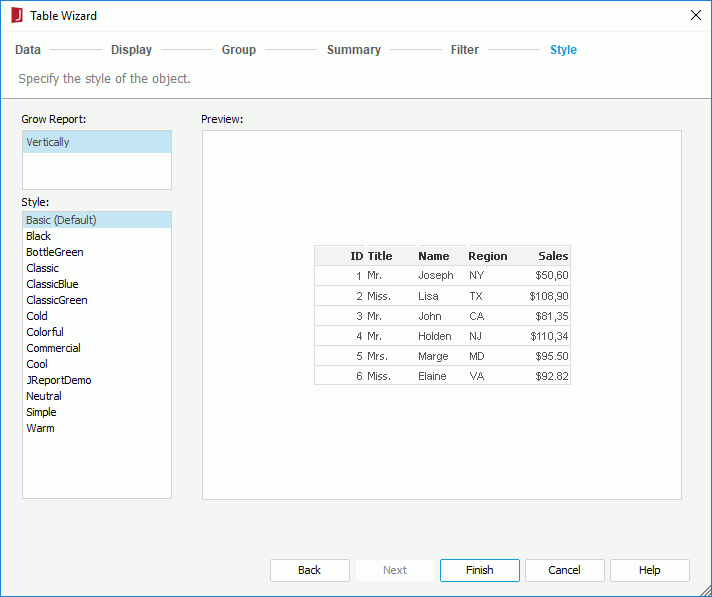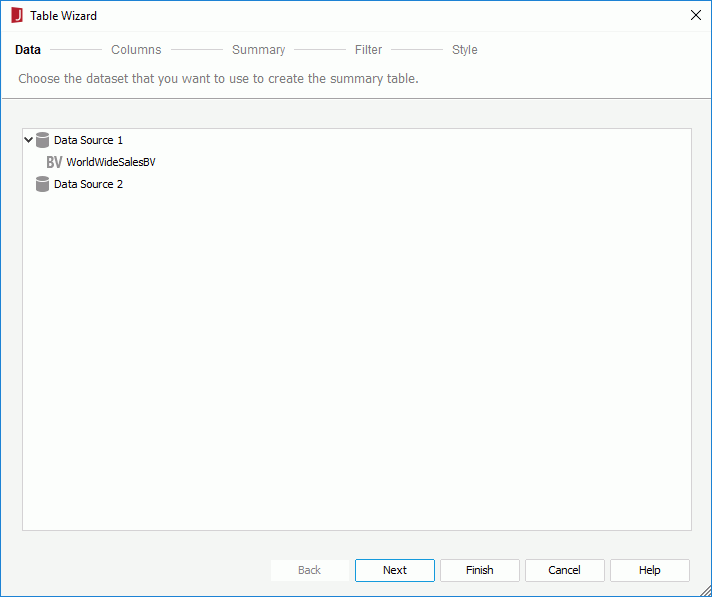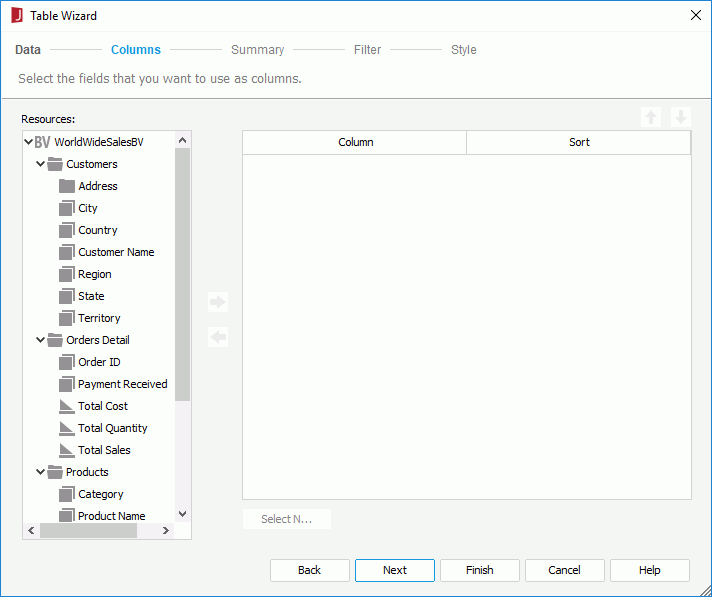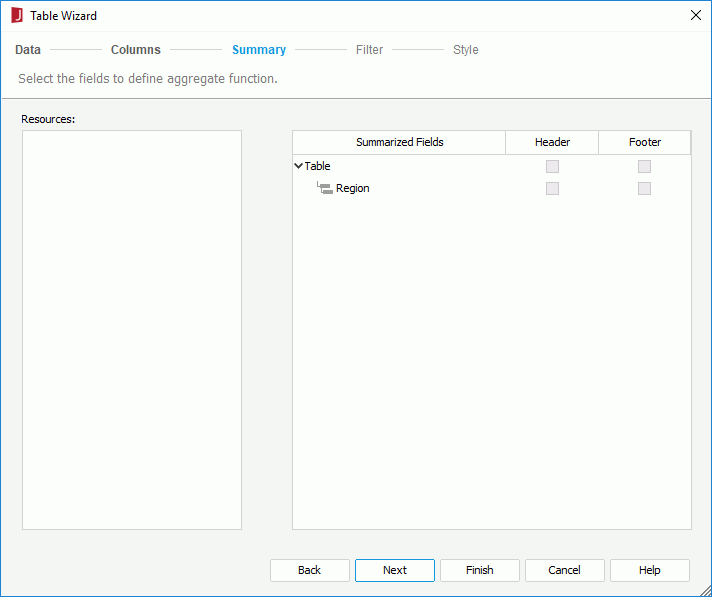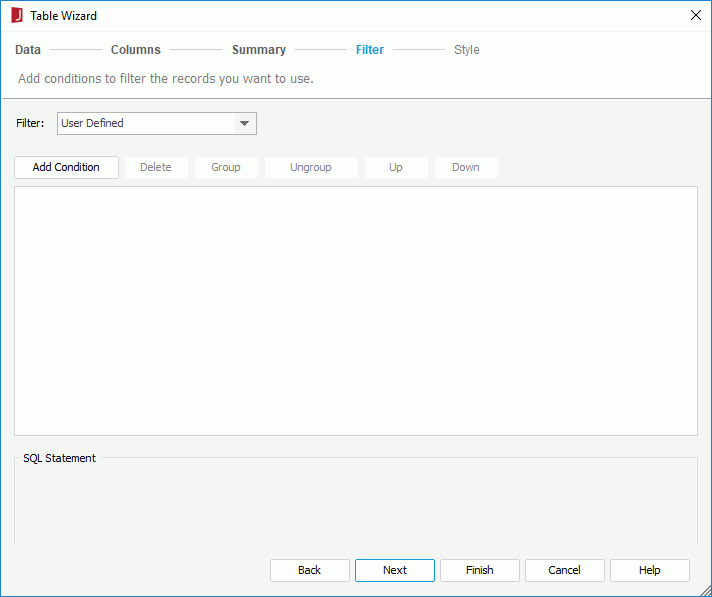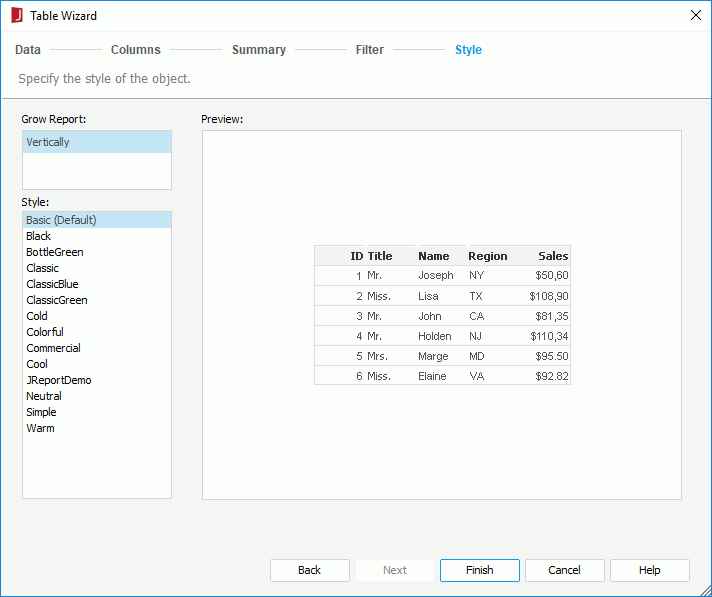Table Wizard Dialog (for Library Component)
The Table Wizard dialog for library component appears when you select a table type in the component type box and select OK in the Select Component for Library Component dialog, or right-click a table and select Table Wizard on the shortcut menu. It helps you to create a table in a library component or modify an existing table.
The wizard is different according to the following table types:
For Group Left, Group Above and Group Left Above
The wizard consists of the following screens:
Back
Goes back to the previous screen.
Next
Goes to the next screen.
Finish
Finishes creating or modifying the table and closes this wizard.
Cancel
Does not retain changes and closes this wizard.
Help
Displays the help document about this feature.
Data
Specifies the business view used by the table. See the screen.
Available data resources
Lists all the business views in the current catalog. Specify the one you want to use.
Display
Specifies the data fields to display in the table. See the screen.
Title
Specifies the title of the table.
Resources
Lists all the available data resources. You can also create dynamic formulas to use in the table.

Adds the specified field to use in the table.

Removes the specified field that is not required in the table.

Replaces the selected field in the table with the specified field in the Resources box.

Moves the specified field one step up.

Moves the specified field one step down.
Show Table Group Structure
Specifies whether to show the group structure of the table.
Display Fields
Lists the fields that you have selected to display in the table.
Display Name
Shows the display names of the selected fields. You can select the name cells to edit them if required.
Sort Fields By
Opens the Sort Fields By dialog to specify how to sort data in the table.
Group
Specifies the fields that you want to use to group the data. See the screen.
Resources
Lists all the available data resources. You can also create dynamic formulas to use in the table.

Adds the selected field as the group by field in the table.

Removes the selected group by field that is not required.

Replaces the selected group by field in the table with the specified field in the Resources box.

Moves the specified group one step up.

Moves the specified group one step down.
Group By
Lists the fields that are used to group data in the table.
Sort
Specifies how groups at the specific group level will be sorted.
- Ascend
Groups will be sorted in an ascending order (A, B, C). - Descend
Groups will be sorted in a descending order (C, B, A). - No Sort
Groups will be sorted in the original order in database. - Custom Sort
Opens the Custom Sort dialog to set how groups will be sorted.
Select N
Opens the Select N dialog to specify the Select N condition.
Summary
Specifies the fields on which to create aggregate functions. This screen is available only when you create a table. See the screen.
Resources
Lists all the available data resources. You can also create dynamic formulas and aggregations to use in the table.

Adds the selected field as the summary field to the table.

Removes the selected summary field that is not required.

Moves the specified summary field one step up.

Moves the specified summary field one step down.
Summarized Fields
Lists all the fields that you want to display and to be summarized in the table.
Position
Works together with the Column option to specify the location where the summary field will be put. Not available when the table type is Group Above.
- Header
Specifies to put the summary field in the header row. If the summary is calculated on a group by field, it will be put in the group header row of the corresponding group; if the summary is calculated on the whole dataset, it will be put in the table header row. - Footer
Specifies to put the summary field in the footer row. If the summary is calculated on a group by field, it will be put in the group footer row of the corresponding group; if the summary is calculated on the whole dataset, it will be put in the table footer row.
Column
Works together with the Position option to specify the location where the summary field will be put. Not available when the table type is Group Above.
- Detail
The summary field with its label will be put in in the first two detail columns. - Summary
The summary field will be displayed in a separate summary column.
Filter
Specifies to filter data displayed in the table. This screen is available only when you create a table. See the screen.
The options in the screen are the same as those in the Edit Filter dialog.
Style
Specifies the style of the table. See the screen.
Grow Report
Specifies the layout of the table.
- Vertically
Creates a vertical table.
Style
Specifies the style of the table.
- <Custom>
There is no style information on it and it is only used to support reports built with previous versions which did not bind any style or the bound style cannot be found in the style list.
Preview
Displays a diagram illustrating the effect of the selected style on the table.
For Summary Table
The wizard consists of the following screens:
Back
Goes back to the previous screen.
Next
Goes to the next screen.
Finish
Finishes creating or modifying the table and closes this wizard.
Cancel
Does not retain changes and closes this wizard.
Help
Displays the help document about this feature.
Data
Specifies the business view used by the table. See the screen.
Available data resources
Lists all the business views in the current catalog. Specify the one you want to use.
Columns
Specifies the fields that you want to display in the table. See the screen.
Resources
Lists all the available data resources. You can also create dynamic formulas and aggregations to use in the table.

Adds the specified field to use in the table.

Removes the specified field that is not required in the table.

Moves the specified field one step up.

Moves the specified field one step down.
Column
Lists the fields that have been selected to display in the table.
Sort
Specifies how groups at the specific group level will be sorted.
- Ascend
Groups will be sorted in an ascending order (A, B, C). - Descend
Groups will be sorted in a descending order (C, B, A). - No Sort
Groups will be sorted in the original order in database. - Custom Sort
Opens the Custom Sort dialog to set how groups will be sorted.
Select N
Opens the Select N dialog to specify the Select N condition.
Summary
Specifies to insert aggregations to the header/footer rows of the table and groups. See the screen.
Resources
Displays the aggregations selected in the Columns screen.
Summarized Fields
Displays the group fields selected in the Columns screen under the Table node.
Header
Represents the table header or the group header of a specific group. After an aggregation is selected in the Resources box, you can select the checkboxes in the column to insert the aggregation in the corresponding header rows.
Footer
Represents the table footer or the group footer of a specific group. After an aggregation is selected in the Resources box, you can select the checkboxes in the column to insert the aggregation in the corresponding footer rows.
Filter
Specifies to filter data displayed in the table. This screen is available only when you create a table. See the screen.
The options in the screen are the same as those in the Edit Filter dialog.
Style
Specifies the style of the table. See the screen.
Grow Report
Specifies the layout of the table.
- Vertically
Creates a vertical table.
Style
Specifies the style of the table.
- <Custom>
There is no style information on it and it is only used to support reports built with previous versions which did not bind any style or the bound style cannot be found in the style list.
Preview
Displays a diagram illustrating the effect of the selected style on the table.
 Previous Topic
Previous Topic
